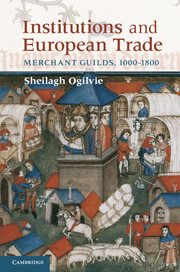Book contents
- Frontmatter
- Contents
- Acknowledgements
- 1 Merchant guilds, efficiency and social capital
- 2 What was a merchant guild?
- 3 Local merchant guilds
- 4 Alien merchant guilds and companies
- 5 Merchant guilds and rulers
- 6 Commercial security
- 7 Contract enforcement
- 8 Principal-agent problems
- 9 Information
- 10 Price volatility
- 11 Institutions, social capital and economic development
- Bibliography
- Index
10 - Price volatility
Published online by Cambridge University Press: 05 June 2012
- Frontmatter
- Contents
- Acknowledgements
- 1 Merchant guilds, efficiency and social capital
- 2 What was a merchant guild?
- 3 Local merchant guilds
- 4 Alien merchant guilds and companies
- 5 Merchant guilds and rulers
- 6 Commercial security
- 7 Contract enforcement
- 8 Principal-agent problems
- 9 Information
- 10 Price volatility
- 11 Institutions, social capital and economic development
- Bibliography
- Index
Summary
If the calends of January fall on a Sunday … grain will be neither cheap nor expensive. If they fall on a Monday … there will be plenty of grain. If they fall on a Tuesday … grain will be dear.
(Anonymous Pisan author of earliest surviving Italian merchant manual, 1278)For just as water will naturally flow into valleys, so goods will be attracted to places where they are most required.
(Venetian merchant Marino Sanudo, 1306)In truth, the traffic and conservation of money are very difficult and in the hands of fortune; rare are they who know how to manage it amid all the contrary tempests, exiles and catastrophes.
(Florentine merchant Giovanni Rucellai, 1473)A basic problem for trade is uncertainty. If economic prospects are too uncertain, people will refrain from doing business. This is bad not just for them but for the entire economy, since it limits exchange and the gains from trade. Price volatility is one major source of uncertainty. Unexpected fluctuations in prices can wipe out a merchant's profits or even his entire business.
One strategy for reducing such uncertainty is to gather information about prices and the factors that might affect them. To obtain information, as we saw in Chapter 9, medieval and early modern merchants used a whole array of institutional mechanisms.
- Type
- Chapter
- Information
- Institutions and European TradeMerchant Guilds, 1000–1800, pp. 391 - 413Publisher: Cambridge University PressPrint publication year: 2011



